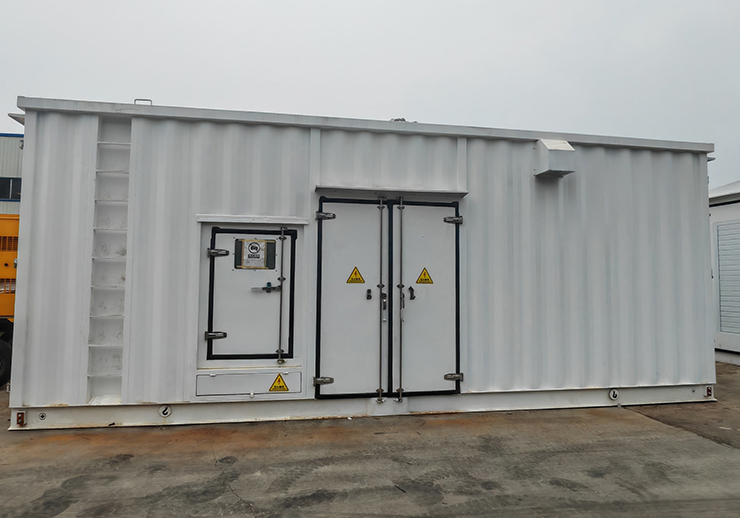Rising Demand for Portable Generators in Construction and Agriculture: Powering Productivity Anywhere
Release time:2025-10-28 Click:9
In an era of rising energy demands and global infrastructure growth, the role of portable generators has never been more vital. These compact yet powerful units provide dependable electricity for construction projects, agricultural operations, and emergency scenarios where grid access is limited or unreliable. Across Europe, North America, and the Middle East, industries are recognizing portable generators as key assets that enhance efficiency, mobility, and resilience.
As climate change, energy uncertainty, and the need for round-the-clock productivity increase, portable power solutions are bridging the gap between sustainability and performance. From powering heavy-duty machinery on construction sites to running irrigation systems in remote farms, these generators have become indispensable.
Portable Generators: The Backbone of Field Operations
A portable generator is a self-contained power system capable of delivering electricity anywhere it’s needed. Equipped with internal combustion engines—usually diesel, gasoline, or dual-fuel—they convert mechanical energy into electrical output. Units range from compact 2kW models for small equipment to large-scale systems exceeding 100kW used on industrial sites.
Their portability and rugged design make them essential for construction contractors, farmers, and disaster relief teams. In the Middle East, where large-scale construction and remote development projects are accelerating, portable diesel generators ensure operations continue smoothly despite challenging environments.
Why Demand Is Growing in Construction
In the construction industry, reliable power is fundamental. From cranes and compressors to lighting and concrete mixers, every tool depends on consistent electricity. However, many project sites—especially those located in undeveloped or off-grid areas—lack access to stable utility power. Portable generators solve this by offering instant, scalable energy that can adapt to different voltage and load requirements.
Furthermore, portable units minimize project downtime. A power outage on a construction site can halt progress and increase costs dramatically. Having an onsite generator reduces dependency on grid fluctuations and ensures continuous productivity.

Q: Why are portable generators preferred on modern construction sites?
A: Because they provide flexibility, reliability, and independence from grid limitations. Portable generators can power equipment, lighting systems, and offices, and can be relocated easily as a project advances from one stage to another. Their durability in extreme weather also makes them ideal for infrastructure work in regions like the Gulf or North Africa.
Powering the Future of Agriculture
Agriculture has also entered an age of digitalization and mechanization, relying heavily on energy-driven systems for irrigation, cold storage, feeding automation, and smart sensors. Portable generators help maintain continuous power during harvest seasons, irrigation cycles, and in remote areas without grid access.
In large-scale farms across the U.S. Midwest or the Middle East’s arid regions, mobile power units are used to run water pumps, greenhouse systems, and food processing equipment. For many small and medium farmers, portable generators represent a cost-effective way to secure operational continuity and protect harvests from spoilage.
Q: Are portable generators suitable for long-term farm operations?
A: Yes. Modern diesel and hybrid generators are designed for both temporary and continuous use. With efficient engines, automatic voltage regulators, and smart control panels, they can support farm operations for months while maintaining optimal performance and low fuel consumption.
Technology Advancements Driving Growth
Recent advancements have made portable generators more efficient, quieter, and environmentally friendly. Manufacturers are integrating smart monitoring systems, allowing operators to track fuel consumption, performance, and maintenance needs via mobile apps or remote dashboards. Hybrid models combining diesel and solar inputs are also entering the market, reducing emissions and fuel dependence.
Noise reduction technologies—such as soundproof enclosures and vibration control—are particularly important for agricultural use near residential areas or livestock zones. These innovations enhance user experience and align with international sustainability goals.
Regional Demand Trends
Europe: Increasing renewable integration and grid instability during peak loads drive the need for backup and temporary power systems, particularly for construction and logistics projects.
Middle East: Rapid infrastructure expansion, desert conditions, and industrial diversification programs like Saudi Vision 2030 are boosting generator demand.
North America: Extreme weather events and rural energy gaps make portable generators a critical part of resilience planning for farms and small contractors.
Together, these markets contribute to a steady annual growth rate of over 5% in the global portable generator industry.
Q: What type of fuel is most efficient for portable generators in construction and agriculture?
A: Diesel remains the most popular due to its high energy density, fuel efficiency, and long engine life. However, hybrid and LPG-based systems are gaining popularity where emissions regulations are strict or sustainability goals are prioritized.
Benefits Beyond Backup Power
Portable generators are not just emergency backups; they are strategic energy tools. Key advantages include mobility, scalability, cost-efficiency, resilience, and sustainability. For agricultural and construction enterprises aiming to achieve greater autonomy and reliability, these benefits translate directly into competitive advantage.
Safety and Maintenance Considerations
While portable generators are built for durability, proper maintenance and operation are essential for safe performance. Regular oil changes, air filter cleaning, and fuel quality checks extend lifespan. Operators should follow grounding procedures, avoid overloading, and ensure adequate ventilation to prevent exhaust accumulation.
Manufacturers are also offering automatic shutdown systems for overload or low oil pressure, reducing the risk of damage and improving long-term dependability.
Sustainability and the Move Toward Hybrid Systems
The global push for decarbonization has led to growing investment in hybrid power solutions. Combining portable diesel generators with solar panels or battery storage allows operations to run cleaner and more economically. During daytime, solar arrays supply power, while generators operate as backup sources at night or during high-load demands. This synergy not only lowers emissions but also extends generator lifespan.
Q: How do hybrid portable generators contribute to sustainability goals?
A: Hybrid systems cut fuel use and CO₂ emissions by up to 40%. They leverage renewable inputs when available and seamlessly switch to generator power when demand spikes, ensuring reliability while meeting environmental standards.
The Future Outlook: Smarter, Cleaner, More Connected
The future of portable generators lies in connectivity, efficiency, and clean energy integration. Manufacturers are investing in AI-based predictive maintenance, IoT-enabled performance tracking, and modular battery add-ons. As smart cities and precision agriculture continue to expand, mobile power will remain an essential enabler of modern productivity.
Conclusion
The rising demand for portable generators across construction and agriculture sectors underscores a global shift toward energy independence and operational flexibility. From powering cranes to irrigating crops, these systems keep critical processes running smoothly in environments where grid power is unavailable or unreliable. With rapid technological progress and sustainability-driven innovation, portable generators are no longer just backup tools — they are key pillars of productivity and resilience in the 21st century.
Hot products
+86 15244567972
Contacts:Jack
